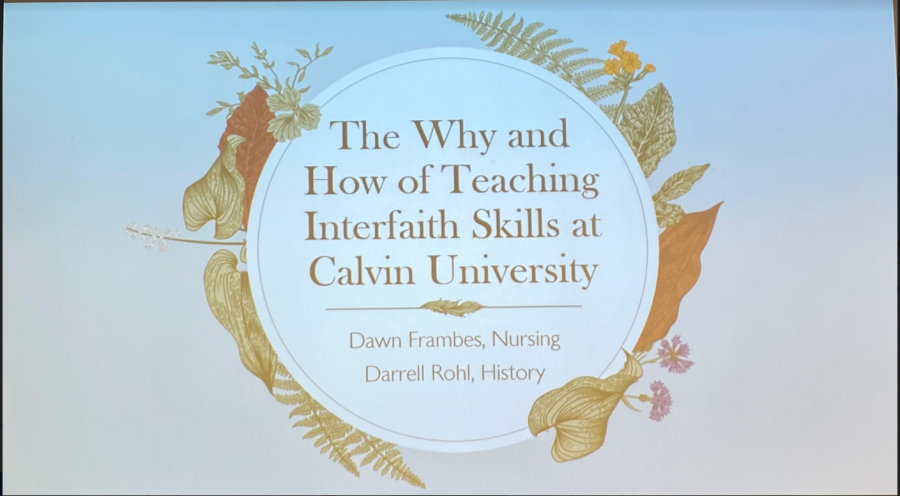The New Interfaith Curriculum Explorers program offers grants for interfaith engagement in the curriculum
Faculty and students involved in interfaith efforts on campus say they connect those efforts to Calvin’s mission.
The New Interfaith Curriculum Explorers — a group of faculty committed to incorporating interfaith perspectives into their work at Calvin — are offering five $600 grants, funded by a larger grant from Interfaith America, to other professors interested in joining the NICE cohort of 2022-2023.
According to Andrew Haggerty, director of Calvin’s Service Learning Center, the grants are provided by Interfaith America, a national organization based in Chicago which Calvin has partnered with for seven years. The organization provides about $2,000 in grants to universities to help integrate interfaith into classrooms; in 2021-2022, there was an opportunity to apply for a $5,000 grant. The grant was approved, and a portion of the grant will go towards creating these five $600 grants, Haggerty said.
Haggerty and five other colleagues — Executive Associate to the President for Diversity and Inclusion Michelle Loyd-Paige, retired history professor Doug Howard, German professor Pennylyn Dykstra-Pruim and history professor Frans van Liere –– attended an institute for interfaith excellence in July 2020. These five individuals make up the original representatives of the New Interfaith Curriculum Explorers who were chosen to represent Calvin at a conference hosted virtually by The Institute for Interfaith Excellence.
The goal of the conference was to “produce an action plan” for furthering interfaith curricula in universities. After the conference ended, Haggerty and the others decided to find a way to continue the mission of interfaith on Calvin’s campus.
“When the [conference] ended we decided to continue meeting over the course of the next year to try to see through the action plan,” said Haggerty.
According to Haggerty, it wasn’t possible to create a core class solely focused on interfaith engagement so he and his colleagues came up with the idea to assist professors teaching core classes by providing workshops that will equip faculty with ways to add interfaith perspectives into their classrooms. The $600 stipends are for professors who are willing to join The New Interfaith Curriculum Explorers cohort in monthly meetings to discuss interfaith engagement in classrooms.
Interfaith in classrooms
According to Haggerty, “interfaith” is a term used to describe working together with other people of different cultures and religions to gain a better appreciation for other people’s beliefs.
Bethany Gamber, co-president of the Interfaith Alliance club, has found that learning about different religions through her leadership in the club to be a rewarding experience.
“I learned that there are so many different religions out there. There are so many different schools of thought, even within Christianity, there are so many denominations,” said Gamber.
Dawn Frambes has been a nurse for 30 years and is an assistant professor at Calvin. She incorporates interfaith into her classroom by teaching her students that they will encounter a diverse group of patients with different backgrounds and personalities. Her goal is to equip her students with empathy and kindness towards other cultures and beliefs.
“We talk about things like managing a team of nurses, thinking about what is the background of the nurses who are working with our patients in this nursing unit, and kind of having an empathetic approach to thinking about what their faith background looks like,” Frambes said.
Van Liere has been teaching for 25 years. The first class he taught on interfaith religions was during interim, about interfaith relations between Christianity and Judaism.
According to van Liere, it was important that the students had a chance to interact with someone who practiced Judaism, so he brought in a rabbi.
“I thought that we shouldn’t just talk about Judaism. We should talk with Judaism, so I invited a rabbi to talk to my interim class,” said van Liere.
Having interfaith perspectives involved in the curriculum ties in with Calvin’s mission of thinking deeply, according to Gamber.
“Calvin specifically, their whole thing is about thinking deeply and becoming well-rounded. I feel like part of being well-rounded is to be exposed to things we are not used to,” said Gamber.







